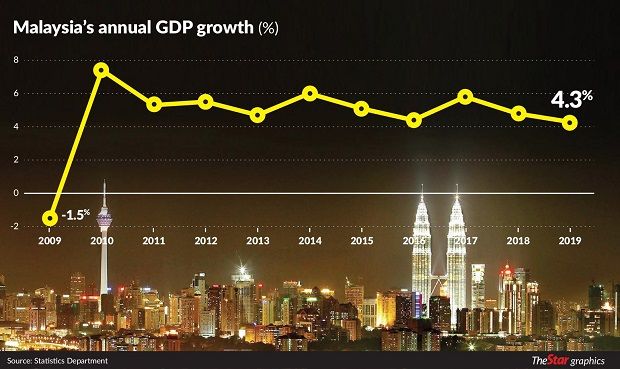Malaysia: Consumer-driven rebound next year
PETALING JAYA: Although the country’s economy is set to rebound next year, it is still not out of the woods, according to economists.
Domestic and external factors could dampen gross domestic product (GDP) growth. However, the stimulus as well as fiscal measures under Budget 2021 could enable the economy to stage a rebound.
Economists are projecting a GDP growth of 6% to 7.3% next year.
In the third quarter, the GDP improved with a slower contraction of 2.7% year-on-year (y-o-y) versus a 17.1% y-o-y contraction in the second quarter.
For full-year, the Finance Ministry predicted that the economy would shrink by 4.5% y-o-y due to the adverse effects of the Covid-19 pandemic.
RAM Rating Services senior economist Woon Khai Jhek told StarBiz that the recovery path in 2021 would be fragile and uneven given the lingering disruption.
“While household spending is recovering from its trough in the second quarter, overall spending power is likely to remain pre-pandemic potential and consumer confidence will remain sensitive to adverse events.
“Moreover, the reintroduction of Covid-19-related restrictions in Europe and the United States is likely to place a dampener on export demand and the recovery momentum. Structural weakness inherent in the residential and commercial property markets is expected to persist, placing a drag on overall growth, ” he noted.
The services sector, especially among non-essential and hospitality sub-segment, would remain under immense pressure given that they are the most vulnerable to economic and social distancing restrictions.
As such, Woon said the overall economic output is not expected to chart a full recovery to pre-pandemic potential in 2021.
Private consumption is expected to lead the rebound next year as income-support measures under Budget 2021 and government agencies would help to pad spending of households, he said.
Bank Islam Malaysia Bhd chief economist Mohd Afzanizam Abdul Rashid is positive about the economy for next year, especially on the external sector.
However, the main concern would be political stability and how it would translate into policy-making, he said.
Economic recovery would depend on the Covid-19 infection rates and how soon the vaccines could be effectively distributed, he said.
The situation is still fluid although the discovery of vaccines appeared promising in light of the recent news from pharma giants like Pfizer, BionTech, Moderna and Astrazeneca.
“This has created excitement in the financial markets.
“There seems to be risk-on mode in the currency markets whereby the Dollar Index has been declining, leading to the appreciation of emerging market currencies which include the ringgit, ” he added.
Afzanizam said Malaysia’s marginal propensity to consume (MPC) is also among the highest in the region, which bodes well for the economy.
For example, he said from 2000 to 2019, the country’s MPC stood at 0.61, or for every RM1 increase in income, it would translate into RM0.61 spending. MPC refers to the proportion of disposable income which individuals spend on consumption.
OCBC Bank economist Wellian Wiranto expected a recovery in private consumption as the employment picture becomes more stable next year.
Similarly, exports would become a more forceful support for economic activities alongside a recovery in global demand.
“In the third quarter data, we see manufacturing activities picking up, even if there might be a soft patch in the fourth quarter due to renewed lockdown risks in various parts of the globe.
“Hence, domestic consumption and exports will be key in supporting economic recovery in 2021, ” he noted.
Woon said while the conditional movement control order (CMCO) is expected to negatively impact the labour market, the magnitude is not expected to be as large as May’s CMCO.
This was shown by the number of job losses recorded by Socso in October, he said, noting that it rose by 0.4% from September and was about 26% lower than the number recorded in May.
As restrictions are being lifted as soon as the outbreak is brought under control, he said unemployment conditions should fare better than 2020. The unemployment rate moderated to 4.6% as at end-September, from its peak of 5.3% in May.
On the overnight policy rate outlook, Afzanizam expected the key benchmark rate to remain unchanged at 1.75% throughout 2021.
He added the fiscal policy via Budget 2021 would do most of the heavy lifting next year.
Source: https://www.thestar.com.my/business/business-news/2020/11/30/consumer-driven-rebound-next-year


 English
English





